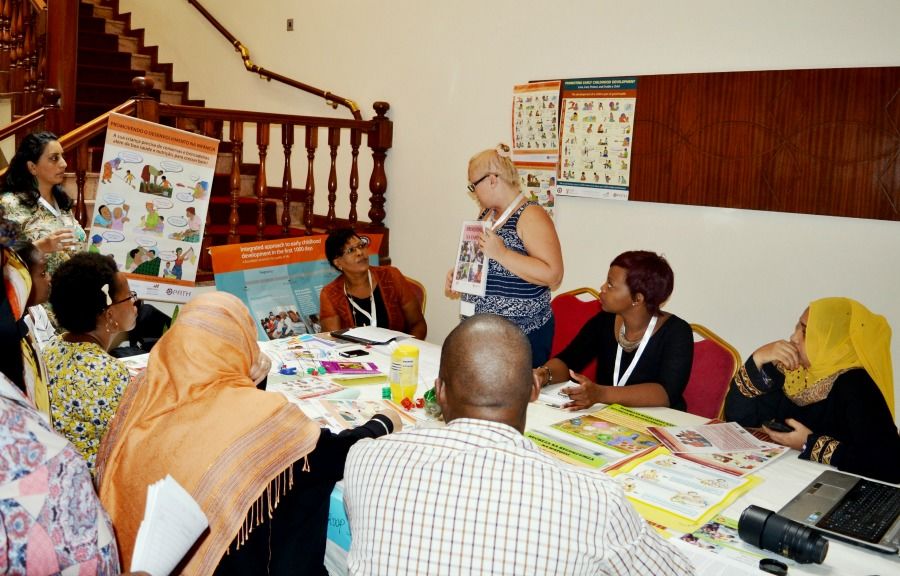Brain development is at its most rapid during the first 1,000 days of life, when early experiences fundamentally shape brain architecture and future potential. By age three, 85% of the brain architecture has already been built. Despite this, the concept that learning begins at birth has not yet caught on and the majority of early childhood development (ECD) programs focus on pre-school age children from age three and up.
Fortunately, health systems provide an opportunity to reach the youngest children and their caregivers—beginning in pregnancy—with services that promote healthy growth and development. UNICEF and the World Health Organization (WHO) have developed a package for health systems that is designed to teach caregivers about responsive care and stimulation practices for their infants and young children, from birth through age two.
The package, called Care for Child Development (CCD), has been successfully implemented in both community and clinical settings. The Conrad N. Hilton Foundation provides support for training using this package given that skills building for parents and caregivers is a focus of our Children Affected by HIV and AIDS Strategic Initiative. We have partnered with organizations working in East and Southern Africa—including PATH, the Aga Khan Development Network and UNICEF—to initially pilot and (more recently) begin to scale-up this package. As a team, we decided to share our experiences using the package, to align efforts, develop a harmonized approach and promote a community of practice to include new organizations interested in using the tools. Toward this end, PATH and the Aga Khan Development Network brought together a group of 30 CCD practitioners from seven countries, as well as the Kenyan Ministry of Health, World Health Organization and UNICEF, in February in Kisumu, Kenya.
Participants shared learnings and discussed options for strengthening and scaling up CCD within multiple settings to best reach caregivers and their young children—including clinical health services, clinic waiting rooms, group education sessions and home visiting by community health workers. The global CCD curricula are often adapted based on needs and local realities, and PATH has integrated messaging on nutrition, gender-based violence, social protection and maternal depression as well. The CCD approach goes beyond the impacts on child development—it has the potential to radically change health care delivery by both formal health personnel and by volunteer community health workers as they learn how to coach and counsel caregivers, establish a strong rapport in the process and making health facilities more caregiver and child friendly. PATH has documented multiple benefits from its integrated ECD health systems work in Kenya and Mozambique, including increased job satisfaction for health workers and the ability to detect and address or refer developmental delays early on.
The Kenya Ministry of Health was also actively engaged in the meeting. Dr. Stuart Kabaka (Deputy Head of the Neonatal, Child and Adolescent Health Unit at the Ministry of Health) stated that early childhood development has been highlighted as a “key objective within the ministry’s overall vision.” The Ministry of Health is coordinating a range of ministries for a multi-sectoral approach and ECD is included in the health sector’s annual work plan. The Ministry of Health is eager to contribute to the development of a national ECD package for the Kenyan health sector. The Care for Child Development experiences and materials developed by PATH and Aga Khan will inform this process.

The meeting in Kisumu underlined the fact that an increasing number of African governments are ready to take on the CCD agenda to support caregivers of young children. Preliminary evidence that was shared during the meeting tells us that integrating ECD as part of the health sector is feasible. It also results in people using services more and the quality of care increasing. Following the meeting, we made plans for further training opportunities in other counties within Kenya. At the global level, our partners have joined forces with the World Health Organization to jointly develop a rollout plan for other countries within the East and Southern Africa region.
This process will include efforts to define a minimum package, to assist governments in developing costed plans, to plan for integration as part of pre-service training of health workers, and to create a policy environment that enables effective integration of ECD services for caregivers and their youngest and most vulnerable children. There is growing consensus that key ECD indicators and data collection processes must be formally integrated as part of national health management information systems.
Overall, the momentum is increasing around efforts to address ECD as part of the health system and the CCD approach provides an evidence-based package that can put young children on a very positive life trajectory by building stable, stimulating and nurturing relationships with their caregivers at the time when it matters most.